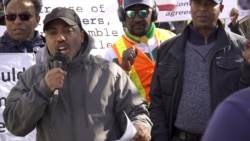Ethiopians in Washington gathered Thursday to support the country’s Nile dam project and voice displeasure over the U.S. role in the negotiations.
At issue is the Grand Ethiopian Renaissance Dam project. Egypt, which relies on the Nile for 90% of its freshwater, has asked for safeguards to slow the filling of the dam to avoid affecting the Nile water level. Ethiopia has said it plans to begin filling the 145-meter-high dam later this year. Planners say it will take four to seven years to fill.
Dozens of demonstrators rallied in front of the U.S. State Department carrying Ethiopian and American flags and signs with slogans including “America Should Mediate, and Not Coerce!”
Many protesters expressed anger at the perceived favoritism of U.S. mediators toward Egypt in the dispute. The U.S. Treasury Department is playing a lead role in mediating technical discussions among Ethiopia, Egypt and Sudan over the construction of the dam, one of the largest infrastructure projects in African history.
Protesters believe Treasury, along with World Bank mediators, are biased toward Egypt. This week Ethiopian negotiators temporarily walked away from discussions, according to state-owned media.
“This dam is being built with the Ethiopian people’s expense and America is siding with Egypt,” protest participant Dawit Galaso Alambo told VOA’s Amharic Service. “We don’t think this is right. Ethiopia should have the right to use its own water and that is its international right. We also want to remind the people and government of America that they can’t meddle by taking sides and disregard the right of Ethiopia to use its own water.”
Once complete, the dam is expected to be the largest hydropower project on the continent, producing 6,000 megawatts of electricity and exporting power to neighboring countries. This is a source of pride for many Ethiopians who do not want the country to make concessions.
“Ethiopia is the uncontested owner of the Nile. Our water is ours. We have every right to do whatever we want,” said Muhedin Siraj Mohammed in Amharic, a resident of the Washington suburb of Alexandria, Virginia, while attending the protest. “There is some pressure at the moment and there are some activities preventing work. And we are here to let those who are part of that realize and stress that this is our right,” he said.
William Davison, International Crisis Group's senior analyst for Ethiopia, said Ethiopia's temporarily walking away from negotiations is a “blow to the process.” Negotiators had hoped to have a technical agreement among the three countries by the end of this month, a deadline that now appears unattainable.
“Now we have to wait and see what the next schedule is,” he told VOA via Skype. “I think the Ethiopian government spokesmen have termed this as a postponement. So not suggesting that the meeting has been canceled forever, but only that they need more time to prepare for it.”
Davison said Ethiopians believe the World Bank rules give downstream countries too much power to veto upstream projects. The country also worries that U.S. military ties with Egypt favorably dispose it to Egyptian arguments in the dispute.
“Ethiopia feels that the international community is, in some way, set up to rule against it or come down on the other party's side in terms of this general issue and that's why they have been reticent about having third party involvement,” he said.
Davison said Ethiopia also believes that third-party observers are overstepping their role in the process.
“The U.S. and the World Bank were supposed to be observers, but it seems to be some form of mission creep with those third parties now actually drafting agreements,” Davison said. “And as we discussed these are an agreement that is not to Ethiopia's liking. They feel that it places too many obligations upon them in terms of protecting Egypt's water rights.”
This story originated in the Africa Division with reporting contributed by VOA Amharic Service’s Habtamu Seyoum.






